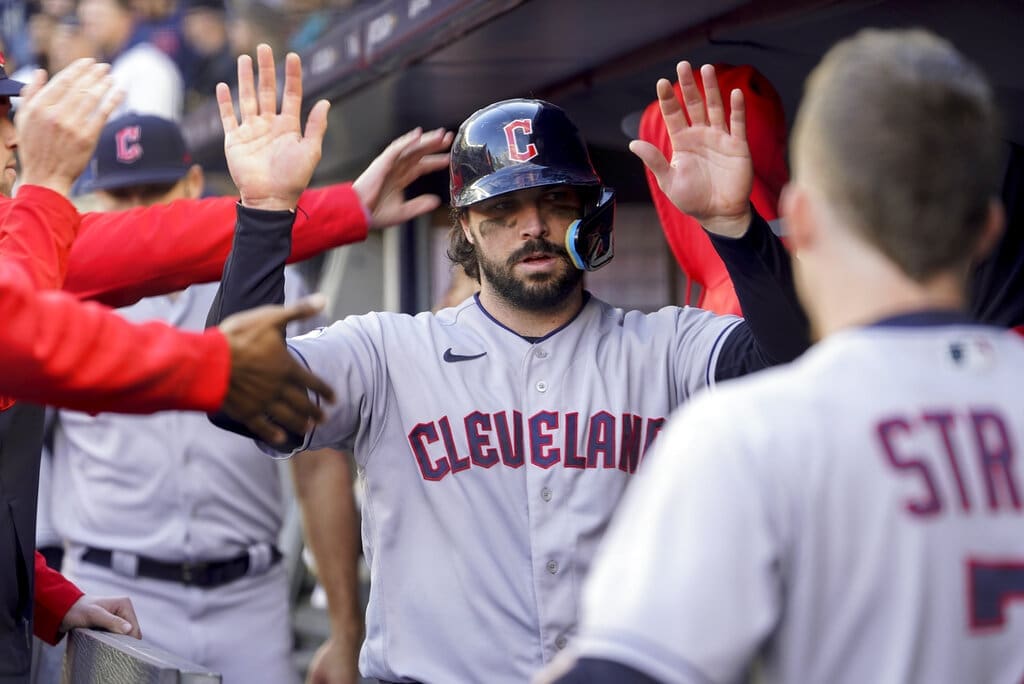Pirates
Perrotto: A Pittsburgh Dream Comes True for This SoCal Kid

Very few kids grow up in Southern California dreaming of someday playing for the Pittsburgh Pirates. Heck, very few kids anywhere dream of playing for a franchise that hasn’t won a division title since 1992.
However, newly signed Pirates catcher Austin Hedges is the exception.
Though Hedges was raised in San Juan Capistrano, Calif., he spent parts of his summers visiting his maternal grandparents in Upper St. Clair. One of the biggest highlights was watching the Pirates play at PNC Park.
Hedges will call PNC Park his baseball home for the 2023 season. He finalized a one-year, $5-million free agent contract Tuesday.
“Spent a lot of time here,” Hedges said with a smile as he talked with reporters in the Pirates’ clubhouse after signing his contract. “It was kind of like a second home for me growing up. My grandpa is passed away now. It’s gonna be really special on opening day. I used to come to games with him as a kid, knowing that PNC Park was one of my favorite parks in the whole league. To be able to call that home now is going to be really special.”
Pirates fans haven’t had much to cheer about since the franchise made three consecutive appearances in the National League wild card game from 2013-15. However, Hedges has always been struck by the loyalty of those long-suffering supporters.
“Growing up in Southern California, they’re not big sports towns,” Hedges said. “Everybody from Orange County or San Diego tends to be from somewhere else. They moved there. In Pittsburgh, it was like, ‘Everyone is a Pittsburgh fan. Everyone is wearing black and yellow. The whole city’s black and yellow.’ That’s the main thing that stood out to me.”
The Pirates are adding Hedges for his defense and certainly not his offense.
The 30-year-old hit just .163/.241/.248 with seven home runs in 105 games for the American League Central champion Cleveland Guardians last season. He has not had a batting average higher than .178 in any of the last four seasons and his career slash line is .189/.247/.331 in 605 games over eight years.
Hedges, though, had seasons of 18, 14, and 11 home runs from 2017-19 for the San Diego Padres. He has not given up on the idea of improving his hitting.
 |
Hedges has spent part of the offseason in Phoenix working on his hitting at Driveline Baseball. He is also working out in his hometown of San Diego at Titleist Performance Institute.
“Hitting has not been as easy as catching has been for me,” Hedges said. “On the hitting side, I’ve had a couple years of some things happened physically where I haven’t been as close to 100% as I would like to be. But my body is in a great spot right now. I feel healthy. I like where my swing’s at.
“I always remember that I’ve done it before. I know it’s in there. I’ve done it before. With a fresh start here, I feel like there’s no reason why I can’t contribute on both sides of the ball.”
Hedges, though, is a premier defender. His 75 defensive runs saved over the last five seasons are the most in the major leagues by a catcher in that span, one more than Roberto Perez.
Perez, of course, began last season as the Pittsburgh Pirates’ catcher. However, his year ended after just 21 games because of a torn hamstring. Hedges and Perez were teammates in Cleveland from 2020-21.
What the Pirates would like from Austin Hedges is for him to bring a little of the culture from the Guardians’ organization.
Cleveland won 92 games and a division title last season despite low expectations externally. The Pirates will most likely be picked to finish in either fourth or fifth place in the five-team National League Central next season by most prognosticators.
“In talking to some of the coaching staff in our short calls so far, it seems like the team took a pretty big step forward last year throughout the process,” Hedges said. “It wasn’t necessarily a playoff team, but the step kind of happened where I feel like an identity started to form. That was what Cleveland did a good job of last year. They found their identity in spring training and were able to stick with it for the whole year.
“One of the things I can help with is to come in, realize what the identity is — I’m not bringing any identity to Pittsburgh; they have an identity right now — and if I can help clarify that identity so we know who are … because if we know who we are, we can go win ballgames. Knowing who you are and sticking to that allows bad games to not seem so bad and good games to be normal games. Then you can repeat it.”















